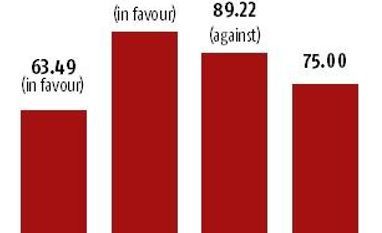British American Tobacco (BAT), which turned down ITC’s proposal for issuing employee stock option schemes (ESOPs), has suggested that the diversified conglomerate consider buying shares in the market for the purpose.
“We support plans to incentivise executives and employees of ITC with company shares as long as the incentivisation is not done in a manner which is dilutive for ITC shareholders. This could include buying shares in the market for issuing ESOPs, which a number of other large and well-respected Indian companies have done in recent years,” a BAT spokesperson said.
However, a buyback for ESOP was not an option for ITC. “The buyback of shares by the company to grant options to employees is not feasible as unlike the UK, regulations in India do not allow companies to hold shares bought back as treasury shares, which can be distributed to employees,” a ITC spokesperson said.
ITC’s last ESOP was in 2010 but the scheme had been modified this time.
“Stock option schemes have in the past worked well in ensuring the continued alignment of the interests of employees with those of shareholders. Ever since equity-linked incentives have been extended to eligible employees, the total shareholder returns generated by the company have grown at a compound annual growth rate of around 20 per cent, significantly outperforming the stock market. The board, after taking due consideration of all issues at the meeting, recommended to the shareholders the introduction of a Stock Appreciation Rights Scheme as the proposed new scheme is an optimal option in the interests of all shareholders as it leads to minimum addition to share capital,” the ITC spokesperson said.
The current scheme would have resulted in a dilution of 0.6 per cent for BAT over 14 years.
“We are surprised and disappointed that the special resolution recommended by the board of directors of the company for approval of the shareholders has not been approved primarily on account of the overseas shareholder, who chose to vote against the resolution,” the ITC spokesperson added.
ITC informed the stock exchanges about this on October 4.
The plan got 63.49 per cent votes in favour against a requisite majority of 75 per cent. While 98.77 per cent of the institutions voted in favour of it, 89.22 per cent of the non-institutional public shareholders (which included BAT) voted against it.
BAT’s current holding in ITC is 29.71 per cent. BAT said that in the past, dilutive executive share schemes were very typical and BAT had voted for them.
“There has been a clear movement, over time, for companies to adopt non-dilutive executive compensation plans. BAT has adopted this approach with respect to its own senior executive share schemes. We have been very clear since 2010 that we would not be supportive of any future proposals that are dilutive to the shareholders of ITC,” the BAT spokesperson said.
BAT, however, said it supported the ITC management. “This is simply and importantly a matter of our fiduciary duty to our shareholders and does not in any way undermine our support for the ITC management and employees,” the BAT spokesperson explained.
BAT is unable to increase its stake in ITC as a result of restrictions on non-Indian companies purchasing further shares in Indian tobacco companies. India closed its doors on new foreign direct investment in cigarettes in 2013. The ban applied to new proposals and existing equity stakes held by overseas companies.
At that time BAT had told Business Standard, “We have 32 per cent in ITC and are very happy with our investment. We have no intentions of increasing our stake in ITC. Our business in India is done only through ITC and therefore the government ruling will have no impact on our business in India.”
However, whether BAT will review its intent if FDI rules are relaxed is not known.
On September 25, BAT announced its chief executive officer (CEO) succession. Jack Bowles, currently chief operating officer of BAT’s international business, will succeed Nicandro Durandro Durante as CEO following Nicandro’s retirement on April 1 next year.
BAT and ITC have a history of spat that dates back to 1994, when the British multinational wanted to wrest control of ITC by increasing its stake to 51 per cent but then ITC chairman Krishnan Lal Chugh threw a spanner in the works. It escalated to a point where BAT demanded the resignation of Chugh and blocked ITC’s diversification into power in 1995. But over the years, equations on both sides has changed under Yogesh Chander Deveshwar.
Unlock 30+ premium stories daily hand-picked by our editors, across devices on browser and app.
Pick your 5 favourite companies, get a daily email with all news updates on them.
Full access to our intuitive epaper - clip, save, share articles from any device; newspaper archives from 2006.
Preferential invites to Business Standard events.
Curated newsletters on markets, personal finance, policy & politics, start-ups, technology, and more.
)